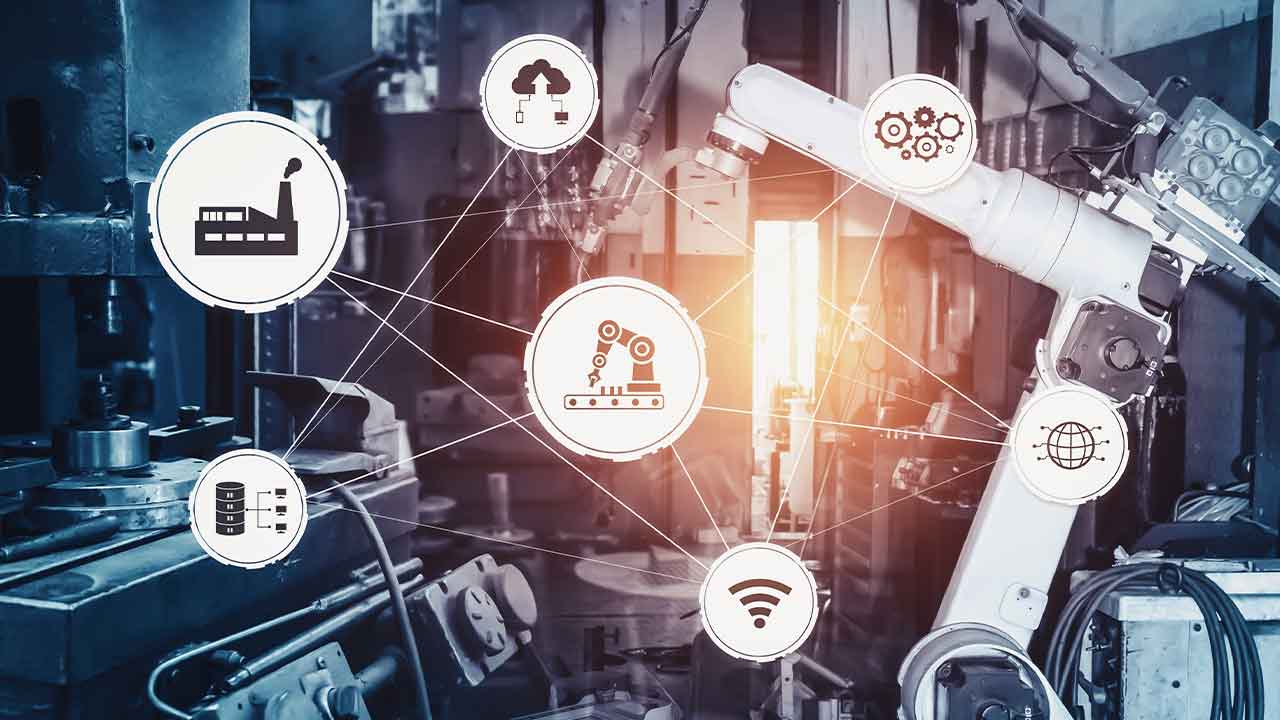How Semiconductors Make Smart Factories Smarter
Over the past 70 years, we have witnessed a massive increase in consumer and B2B customer demand. According to Statista’s recent analyst report, the smart factory market will grow to about $244.8 billion U.S. dollars by 2024, a compound annual growth rate (CAGR) of 9.6 percent.
In the new age of industrialism—Industry 4.0, also known as industrial IoT—manufacturers are faced with a unique challenge: how do they continue to meet exponentially growing demand in the face of increasing production complexity, ever-evolving cybersecurity threats and the corporate responsibility to ensure sustainable business practices in manufacturing?
The answer begins with the most foundational component in today’s digital technologies: the semiconductor. By advancing semiconductor innovation and encouraging further implementation of smart technologies powered by advanced chips, manufacturers will be able to ensure that production keeps pace with rising demand as factories become even more complex and connected.
Collecting Data to Further Manufacturing Efficiency
How do we define a smart factory? Generally, several qualifications must be met, including reliable connectivity, autonomous production, and transparent, flexible supply chains. But perhaps most important is the smart usage of data. Meeting demand means properly implementing data-driven solutions in the Industrial Internet of Things (IIoT); so, manufacturers today ensure that they are maximizing the amount of useful data their factories collect by implementing IT solutions for manufacturing. Sensors, actuators and control systems all work together to enable components in a smart factory to correctly collect, evaluate and process real-time data before executing or initiating the appropriate action or reaction. If the ultimate goal is to create autonomous production, then data collection and machine learning are the foundation by which independent communication between machines, workers, systems and products will be enabled.
Semiconductors are at the heart of data collection. Sensors enable the monitoring of everything from single components of production machinery to a smart factory’s entire digital ecosystem. Advanced sensor technologies also have a direct impact on efficiency; for example, by optimizing production flow through the early detection of manufacturing defects. Optimizing efficiency through data requires optimized data collection and processing. Efficiency cannot improve unless each step is followed sequentially, and that process begins with adequate sensing solutions.
Computing at the Edge to Reduce Processing Times
Importantly, data—and especially the huge amounts of data generated in today’s factories—will not advance automated manufacturing systems unless it is processed extremely quickly and securely. How can we ensure the usefulness of the data being collected by a smart factory is being maximized? Through edge computing, which, in its simplest terms, is defined as the storage and processing of data where it is generated, rather than in a remote cloud. To be clear, the benefits of cloud and edge-based computing are maximized when both are used in tandem; however, processing delay times are reduced when specific tasks are computed locally.
Today, advances are being made in Edge Artificial Intelligence that allow for the improvement of AI algorithms on the edge, rather than having to move data to the cloud for processing, risking privacy and latency concerns. Semiconductors are vital to Edge AI, enabling MCUs to identify at-risk equipment, improve connectivity and communication across devices, secure critical information and much more. Implementing advanced chip-powered solutions ensures that data is processed quickly, potential issues are identified as or before they happen, and valuable information remains secure. More about The Intelligent Edge: What it is, what it’s not, and why it’s useful
Security for Edge Computing
Data transfer requires various levels of security. For edge computing, only certain data may leave the system, while other data must remain in the edge device. Integrity of the edge devices is checked continuously, and ongoing monitoring is implemented to ensure system software has not been manipulated. Planned updates of the system software must also be verified.
For communication with the cloud, the edge device must first check the authenticity of the server and/or data service and then send the data encrypted. Currently, this is done using asymmetric cryptography methods and is supported by a public key infrastructure.
Infineon offers “embedded trusted platform solutions” specifically for edge devices. They can be used to ensure the integrity of the system, to check the authenticity of communication partners, and to securely encrypt data.
Ensuring Sustainability Without Sacrificing Efficiency
While the core concern of manufacturers is to ultimately meet the demand of their consumer base, organizations today cannot lose sight of their responsibility to act sustainably. Rising energy demand means energy-efficient technologies are more vital than ever, as they enable energy savings by uncovering inefficient production flow, optimizing logistics planning and anticipating maintenance needs.
Optimizing production versus optimizing sustainability is no longer a binary choice. Implementing the most efficient solutions often simultaneously equates to implementing the most sustainable technologies.
The “smartness” of a smart factory relies on the ability to collect large amounts of data while quickly processing that data to improve production efficiency. That process begins at the heart of key manufacturing technologies with the semiconductors that power them. As producers face increasing demand, it is vital to harness the capabilities enabled by advanced microchips to ensure efficiency, immediate diagnostics and sustainable production.


